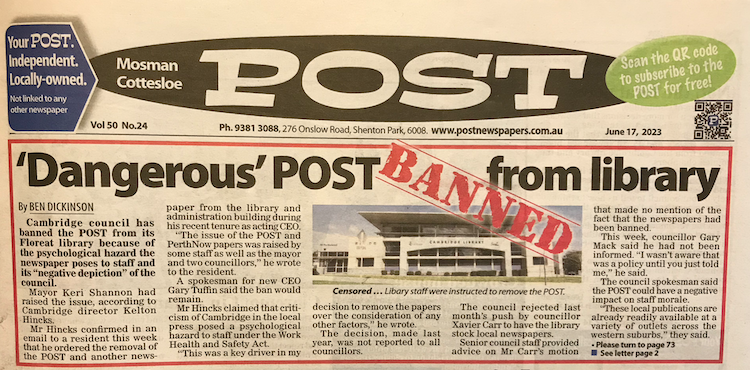… or … The logical fallacy “Somebody think of the CHILDREN/ Lovejoy’s Law” updated for 2023.
Let’s state right off that nobody should harm children. Workplaces are often unsafe and employers need to fix that. Nobody should harm children or place workers in unsafe conditions. Hurting children is bad. Hurting workers is bad.
An ethical scenario
I teach ethics to people who will become librarians. Every study period I grab a scenario from last week’s news and give it to students before our Zoom class about ethics. It is a back up because I invite the class to bring their own examples. Many students are in industry, or have been library/archives/records users, and we usually use their far meatier examples.
This study period I used the example of Rainbow Storytime being banned in Goulbourn library in early June. In my imaginary scenario, the chief executive did not cancel the event because they were “unable to guarantee the physical and psychosocial safety of council’s employees”. In the fictional example the CEO actually expressed concerns about council employee safety, and asked the student, as library manager, how their professional regulatory framework, competencies and ethics guided the situation.
And I added another twist. The real Goulbourn Library included real Reconciliation Storytime among other storytime sessions in the same event registration package as their real Rainbow Storytime. In my scenario, BOTH storytimes had objections from the same group. In my imaginary scenario protesters complained that the events were adult content being forced on children, and made similar threats to council staff. I asked students whether the professional framework would guide them to act differently for each storytime.
What happens when a library runs Drag Queen Storytime?
Turns out, sometimes there are real-life impacts of running Drag Queen Storytime in public libraries. Totally booked out attendance. Large community support. Like last Saturday, when around 200 people turned up at Maylands Library in Perth to show their support and provide a counterpoint to a very small number of picketers at an event now entering its sixth year. In April this year, an online petition to cancel a Drag Storytime in Victoria’s Oakleigh Library was reported to have only a quarter of the signatures of a different online petition supporting the event (Austin & O’Meara, 2023).
It even results in libraries carrying out what their funders pay them to do, which is to provide a community service open to all, with an ethical remit to remove barriers to free access to information.
When we briefly touched my ethical scenario in class, I pointed students to the Australian Library and Information Association’s 2022 Statement of support for Rainbow Storytimes, which states in part:
Enabling an inclusive environment where differences are valued and all individuals are treated fairly and with courtesy, dignity and respect is part of ALIA’s Professional Conduct Statement. ALIA recognises that for some groups in our community, such as LGBTQIA+ people, collections, programs and services have not always been as inclusive and representative as they should have been. It is in this context, that we reiterate our commitment to ensuring that libraries provide inclusive and safe environments for all individuals, including LGBTQIA+ people.
ALIA, 2022
Psychological safety and moral injury in the workplace
In the Goulbourn example, I thought “psychosocial safety” of council workers was an interesting turn of phrase. Especially in the context of the known psychological, social and health risks to workers placed in situations likely to cause moral injury. And the fact that library staff are council workers.
Moral injury is a psychological harm caused by the
strong cognitive and emotional response that can occur following events that violate a person’s moral or ethical code… [including]…a person’s own or other people’s acts of omission or commission, or betrayal by a trusted person in a high-stakes situation
Williamson et al., 2021
A recent example of moral injury is the impact on health care workers forced to compromise ethical standards of patient care and safety in circumstances of pandemic exhaustion and under-resourcing. Or, any academic who has to choose between using their finite time to mark all student assessments by a deadline, or to stop and spend several hours documenting a suspected academic integrity case for a single student, which is unlikely to result in more than the student name being entered in an internal database.
The “psychological harm” playbook extended
I am guessing that the Chief Executive Officer of Cambridge Council, which runs Floreat Library, in Western Australia, also liked the phrase “psychological safety”. Because, you know, libraries are dangerous things. Causing harms. Harms that must be stamped out to fulfil legal duty of care to council staff.
So – no Drag Queen Storytimes for Goulbourn because we must think of the psychological safety of council workers. Well, SOME council workers.
In Floreat Library? The CEO ordered the library to stop stocking two local free newspapers that were politically critical of the council. Why? “criticism of Cambridge in the local press posed a psychological hazard to staff under the Work Health and Safety Act”.
I have a new backup ethics example for next study period.
I am interested to see where this playbook will further lead for libraries.
References
Austin, S., & O’Meara, J. G. (2023, April 28). Won’t somebody please think of the children? Their agency is ignored in the moral panic around drag storytime. The Conversation https://theconversation.com/wont-somebody-please-think-of-the-children-their-agency-is-ignored-in-the-moral-panic-around-drag-storytime-204182
Dickinson, B. (2023, June 17). “Dangerous” Post Banned from library. Mosman Cottesloe Post.
Williamson, V., Murphy, D., Phelps, A., Forbes, D., & Greenberg, N. (2021). Moral injury: The effect on mental health and implications for treatment. The Lancet Psychiatry, 8(6), 453–455. https://doi.org/10.1016/S2215-0366(21)00113-9










